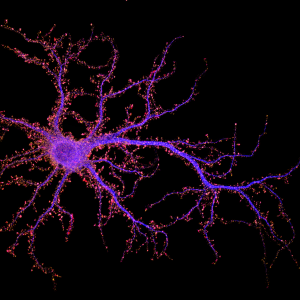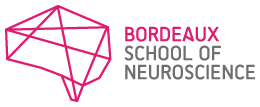Course directors
- Cécile Charrier (Institut de Biologie de l’ENS, France)
- Julien Dupuis (University of Bordeaux, France)
June 24 – 9:00am
Corette Wierenga (Radboud Universiteit, Netherlansd)
Coordination of excitatory and inhibitory synapses via dendritic endocannabinoid signaling.
June 24 – 11:00am
Franck Polleux (Columbia University, USA)
Synaptic and molecular mechanisms underlying the emergence of feature selectivity in hippocampal neurons.
June 25 – 11:00am
Nelson Rebola (Institut du Cerveau, France)
New insights into the cellular mechanisms regulating interneuron activity in the neocortex.
June 26 – 11:00am
Monica Di Luca (Università degli Studi di Milano, Italy)
Dynamic Synapses: local regulation and the long arm to the nucleus.
July 4 – 11:45am
Cécile Charrier (ENS Paris, France)
Insights from human-specific genes on synaptic development.
July 7 – 9:00am
Peter Scheiffele (Universität Basel, Switzerland)
Molecular mechanisms of neuronal circuit formation and plasticity.
July 8 – 5:00pm
Michael E. Greenberg (Harvard Medical School, USA) Virtual talk
How nature and nurture conspire to control brain development and function.
July 10 – 9:00am
Erin Schuman (Max Planck Institute for Brain Research, Germany)
Messages and Machines at Neuronal Synapses.
July 10 – 11:00am
Patrik Verstreken (VIB-KU Leuven Center for Brain & Disease Research, Belgium)
Targeting dementia by tackling synaptic Tau.
Astghik Abrahamyan, Institute for Neurophysiology , Germany
Pauline Belzanne, IINS, Bordeaux University, France
Ségolène Bompierre, Radboud Universiteit, Nijmegen, Netherlands
Romain Boularand, IINS, Bordeaux University, France
Ivo Calaresu, IINS, Bordeaux University, France
Estelle Cartier, Neurocentre Magendie, Bordeaux, France
Meera Chandra, IINS, Bordeaux University, France
Melissa Cizeron, Mechanisms in Integrated Life Sciences, Lyon, France
Florelle Domart, IINS, Bordeaux University, France
Audrey Dufau, IINS, Bordeaux University, France
Dominique Fernandes, IINS, Bordeaux University, France
Matteo Fossati, CNR Institute of Neuroscience, Milano, Italy
Anne-Sophie Hafner, Radboud Universiteit – Nijmegen, Netherlands
Cyril Hanus, Institute for Psychiatry and Neurosciences of Paris, France
Melissa Herman, Institute for Neurophysiology , Germany
Etienne Herzog, IINS, Bordeaux University, France
Akshay Kapadia , Radboud Universiteit – Nijmegen, Netherlands
Simon Lecomte, IINS, Bordeaux University, France
Lynette Lim, VIB-KU Leuven Center for Brain & Disease Research, Belgium
Oriane Mauger, Max Planck Institute of Psychiatry – Frankfurt, Germany
Amine Mehidi, IINS, Bordeaux University, France
Camille Mergaux, IINS, Bordeaux University, France
Emilie Pacary, Neurocentre Magendie, Bordeaux, France
Olivier Rossier, IINS, Bordeaux University, France
Margaux Saint-Martin, IINS, Bordeaux University, France
Chao Sun, Aarhus University, Denmark
Silvia Turchetto, Aarhus University, Denmark
Vasika Venugopal, IINS, Bordeaux University, France
Viviana Villicaña Muñoz, IINS, Bordeaux University, France
Exposure to central topics in synapse biology, and hands-on experience with exciting projects with innovative techniques
The research in synapse biology holds a central place in Neuroscience, as it connects findings in molecular and cellular Neuroscience to the understanding of circuits and behaviour. In addition, synaptopathy is a major pathogenic mechanism in both neuropsychiatric and neurodegenerative disorders. The last decades have brought enormous advances in the methodologies used to study synapses, and which endow researchers with the possibility to bridge from the molecular analyses of synapses to cellular, circuits and behaviour approaches to tackle central questions about how the brain works.
This course provides the opportunity to learn from experts in the field about questions at the forefront of synapse biology, and to obtain hands-on experience with innovative techniques to study synapses. These include gene transfer, live imaging of proteins and signalling molecules (including in vivo 2 photon microscopy), superresolution microscopy for cellular imaging of proteins at excitatory and inhibitory synapses, electrophysiology, animal behaviour and computational methods.
- Synaptic traficking
- Synaptogenesis, synapse adhesion and synapse maintenance
- Presynaptic mechanisms
- Inhibitory synapses
- Structural and functional synaptic plasticity
- Synaptic integration in neuronal networks
- Calcium dynamics and signaling
- Microglia in the shaping of neural circuits
- Synaptic dysfunction in disease
- Synaptic computation
- Whole cell patch clamp recordings in brain slices
- Patch-seq / RNAseq
- Co-culture synaptogenic assay
- Synaptic interactome analysis through proximity-dependent labeling
- Stereotaxic surgery with cannulae implantation
- Behavior analysis
- Confocal time-lapse imaging and FRAP measurements
- FLIM-FRET measurements for activity sensors
- Single-molecule tracking and PALM studies
- Direct stochastic optical reconstruction microscopy (dSTORM)
- hiPSC culturing and neuronal differentiation
- MEA recording: Axion Maestro Pro
- Two photon imaging

OUR SPONSOR

